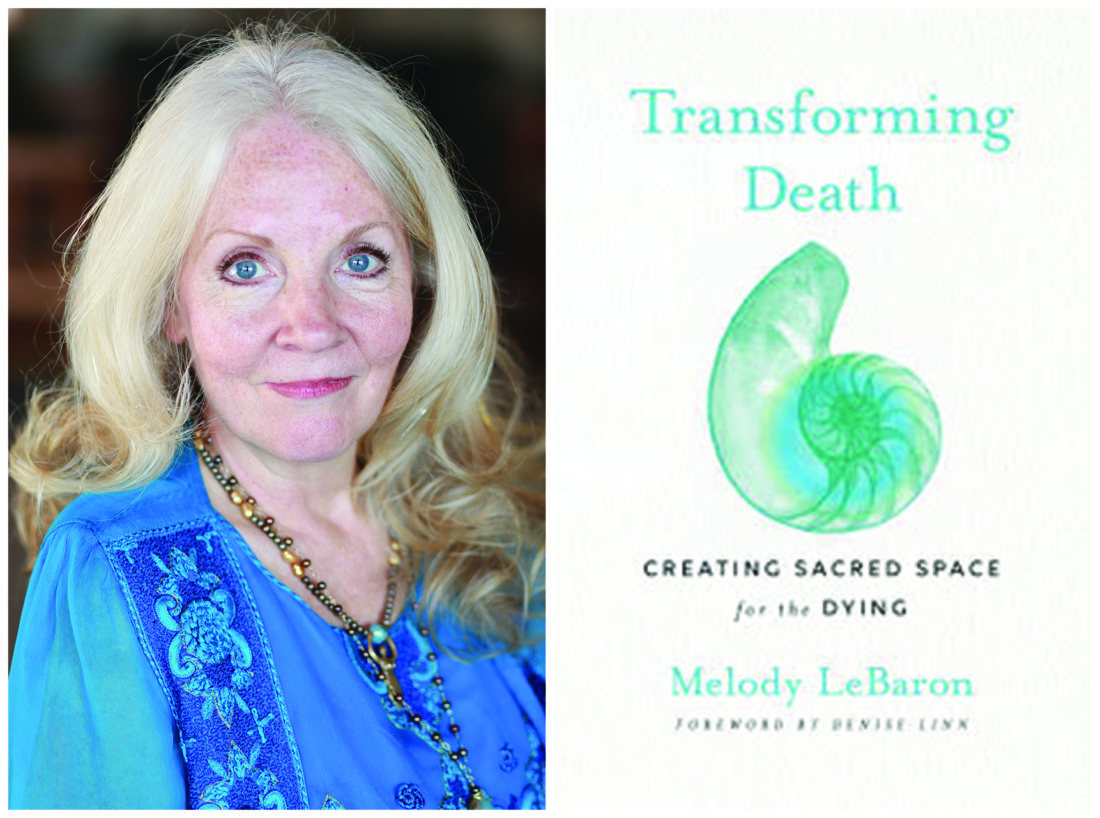Melody LeBaron has had plenty of experience with death and dying.
The deaths of her mother, her sister, her father, two very close friends and her son set her on a journey to learn more about how to ease the passage of a loved one from this world to the next.
“There’s just such limiting views on death in our culture,” LeBaron says. “We speak so little of it, hide it away. We did it better before the American Medical Association medicalized it.”
Like the process of birth in the 1970s, people are taking dying back from the hospitals and allowing loved ones to participate more in the process, says LeBaron, of Weaverville, who offers services in transforming space, self and dying, and is the author of the new book, Transforming Death: Creating Sacred Space for the Dying, available on Amazon as an e-book or paperback.
“We embalm the dead, filling them with toxic chemicals, put them in coffins that will never decompose and bury them,” LeBaron says. “There are better, more responsible ways to do this.”
People who are facing death, as well as their families, need to make dozens of decisions large and small, LeBaron says, and everyone should have a plan in place before the final moments of life.
LeBaron’s book is a sort of roadmap of what happens as someone approaches death, what loved ones can expect and what they might do to ease the process for the one dying. She writes about her experiences and specifically about how the practice of yoga helped prepare her for the deaths of loved ones and her own eventual death. “When well done, all of yoga is preparation for the moment of death,” she says.
When her mother died in her mid-50s from cancer in 1990, LeBaron says she felt inexperienced and uncertain. She wasn’t sure what to do — whether to hold her mother’s hand, what to say, even whether she should speak.
As her life approached its end, LeBaron and her sisters discussed caring for their mother after her death.
“My sisters agreed to help me,” she writes in her book, “and together we asked our dying mother if she wanted us to be the ones to dress her body for burial. ‘Yes,’ she had whispered. ‘Thank you.’
“Now we stood just inside the doorway, looking at her still, cold form, and it didn’t seem like a good idea at all.
‘“I can’t do this!’ I thought, panicking, wanting to run out and into the sunshine.”
But LeBaron and her sisters did dress their mother, style her hair and put on her makeup. It was a sacred and transformative experience. “Touching someone who has died is a difficult thing to do,” she says. “It’s also very healing. It helps begin the grieving process.”
When her 17-year-old son, Logan, died seven years later after an auto accident, LeBaron arrived at the hospital. She leaned over his still form and told him she would help him recover, however long it took, or she would support him equally if his decision was to leave. Later, she clearly felt his desire to leave. There was no fear, she says, just an eagerness to go on. Her ex-husband reported having the same experience, as though Logan had come to both of them and told them of his decision to go.
Although her grief was overwhelming, she found comfort in knowing he had been ready to die, and she has felt his presence many times since, along with that of her mother and sister.
And while her son died suddenly, LeBaron recommends people who have a terminal diagnosis talk about their wishes with family members and loved ones. “The patient and their family need to be the locus of control in dying, just as in birth,” she says.
As LeBaron experienced so many deaths of people close to her, she learned how to help other people through the process. “When my mother died, I was completely inexperienced,” she says. “This book contains everything I needed to know when my mom died.”
Our culture denies that death is an experience that can be prepared for and embraced as natural, LeBaron believes. Too many adults have been sheltered from death as children and have never come to understand the experience, she says.
We also want people to rush through the grieving process and get back to normal, which LeBaron sees as emotionally and physically unhealthy. Unresolved grief, as with any emotion, can cause a number of health and emotional problems.
“We need to bring grief back into the circle of life,” LeBaron says. “Death is as much a part of life as birth. It happens to all of us. If we acknowledge and embrace that, we’ll be better for it.”




Before you comment
The comments section is here to provide a platform for civil dialogue on the issues we face together as a local community. Xpress is committed to offering this platform for all voices, but when the tone of the discussion gets nasty or strays off topic, we believe many people choose not to participate. Xpress editors are determined to moderate comments to ensure a constructive interchange is maintained. All comments judged not to be in keeping with the spirit of civil discourse will be removed and repeat violators will be banned. See here for our terms of service. Thank you for being part of this effort to promote respectful discussion.